Solenopsis globularia (F. Smith)
 Type location Brazil
(Myrmica globularia, Smith, 1858b: 131; all forms; in Solenopsis
Roger, 1863b: 32) - see below Type location Brazil
(Myrmica globularia, Smith, 1858b: 131; all forms; in Solenopsis
Roger, 1863b: 32) - see below
junior synonyms (Pacheco & Mackay, 2013: 164)
littoralis (Solenopsis globularia
subsp. littoralis
Creighton, 1930b: 113, illustrated, all forms) from USA - no
images on Antweb (March 2019) [junior
synonym mobilensis (Solenopsis globularia subsp. mobilensis,
M R Smith, 1931a: 20, worker) from USA - see https://www.antweb.org/specimen.do?name=casent0913898]
pacifica (Solenopsis globularia subsp. pacifica,
Wheeler, 1919c:
273, worker & male; Wheeler, 1924a: 108, queen)
from Galapagos Is. - see https://www.antweb.org/specimen.do?code=castype00446
stenheili (Solenopsis steinheili, Forel,
1881: 11, worker) from Antilles Is.
[junior synonyms borinquenensis (Solenopsis globularia
var. borinquenensis, Wheeler, 1908a: 131, illustrated, worker;
unavailable in HNS) from Puerto Rico - no images on Antweb
(March 2019)
cubaensis (Solenopsis
globularia (F. Smith) var cubaensis, var. nov., Wheeler,
1913b: 493, worker) from Cuba - no images on Antweb (March 2019)
all forms
described (see Bolton, 1995)  . .
|
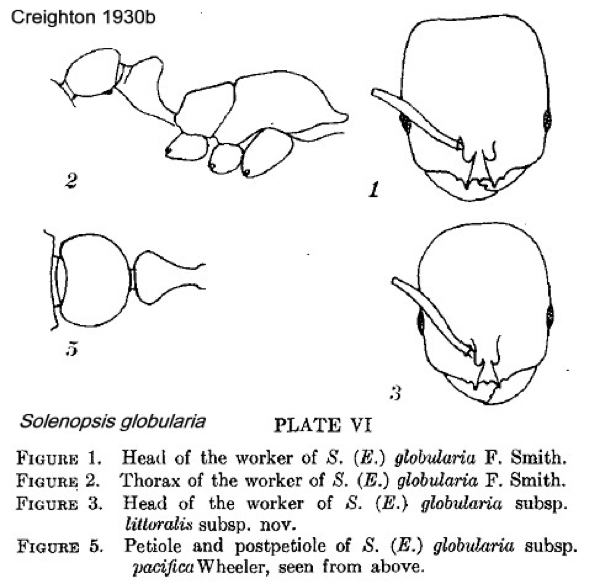 F Smith's (1858b)
description is at F Smith's (1858b)
description is at  . Forel's (1881)
description of steinheili
is at . Forel's (1881)
description of steinheili
is at  . Wheeler's (1913b)
description of cubaensis is at . Wheeler's (1913b)
description of cubaensis is at  . A comprehensive illustrated review was
provided by Creighton (1930b: 108 ff), this, including his description
of littoralis is at . A comprehensive illustrated review was
provided by Creighton (1930b: 108 ff), this, including his description
of littoralis is at  . .
Although Creighton (1930b: 111) appears to distinguish
between minor workers, TL 1.7 mm, and major workers, TL 2.0 mm, there
does not appear to be any structural difference, such as in S.
geminata.
Pacheco & Mackay (2013: 54) proposed synonymy of all
varieties and subspecies as the polytypic S. globularia.
Their separation perhaps can be questioned as they wrote how, The eyes are large, with 12-25 ommatidia. Solenopsis globularia is polymorphic, while S. bucki, S. desecheoensis and S. lucayensis are monomorphic, based on examined material.
Pacheco, J.A. & Mackay, W.P. 2013.The systematics
and biology of the New World thief ants of the genus Solenopsis (Hymenoptera:
Formicidae). The Edwin Mellen Press, Lewiston. 502 pp.
The specimens shown at the bottom of this page were
collected in Congo, Brazzaville, by pitfall trapping, by Yves Braet
& Eric Zassi, 2007, and appear to be the first instance of this
species anywhere outside the Americas. The dark colour is shared with
the subspecies recorded primarily from the Caribbean area. The very
distinctive wide postpetiole and other features separate the species
from all other described Solenopsis, let alone from any known
from Africa.
|
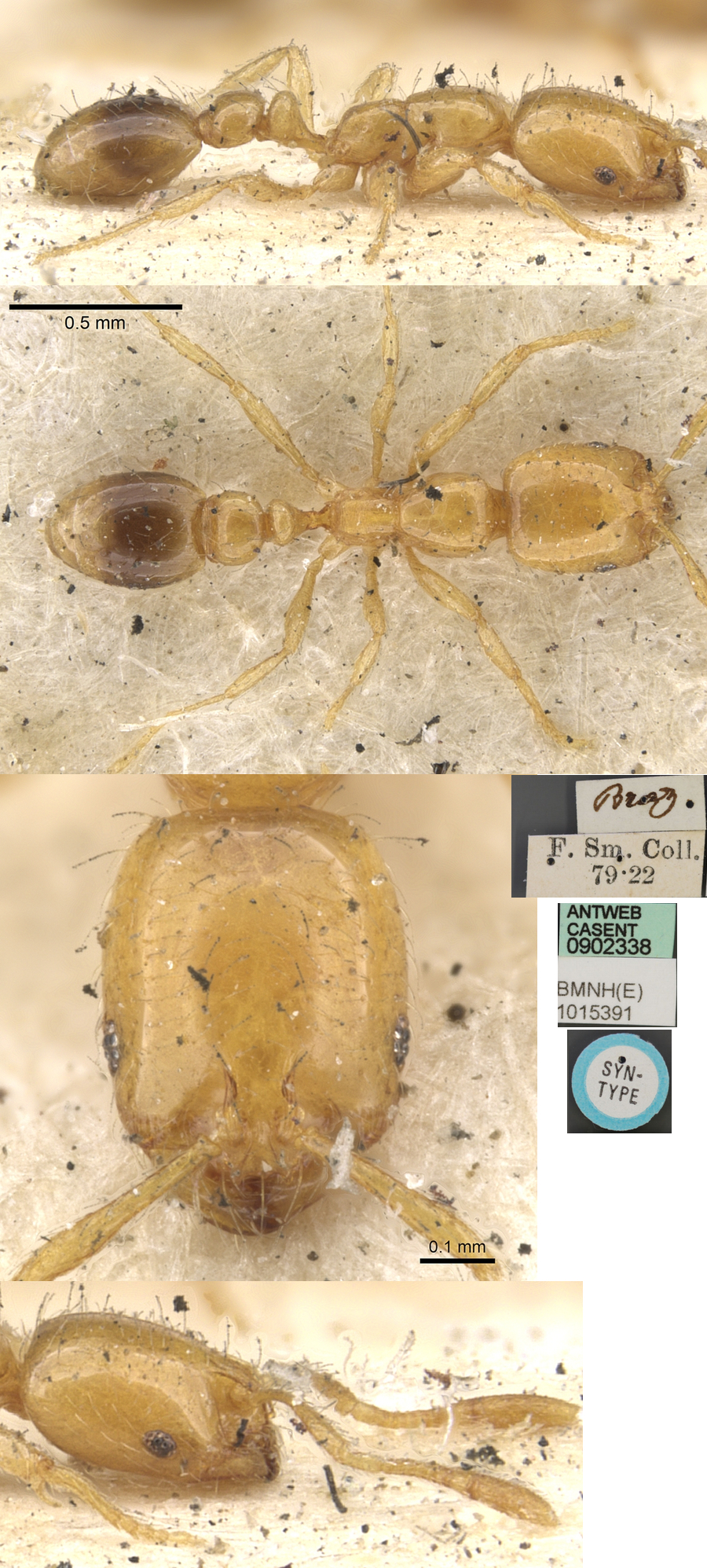 The
photomontage is of a syntype worker collated from http://www.antweb.org/specimen.do?name=casent0902338. The
photomontage is of a syntype worker collated from http://www.antweb.org/specimen.do?name=casent0902338.
|
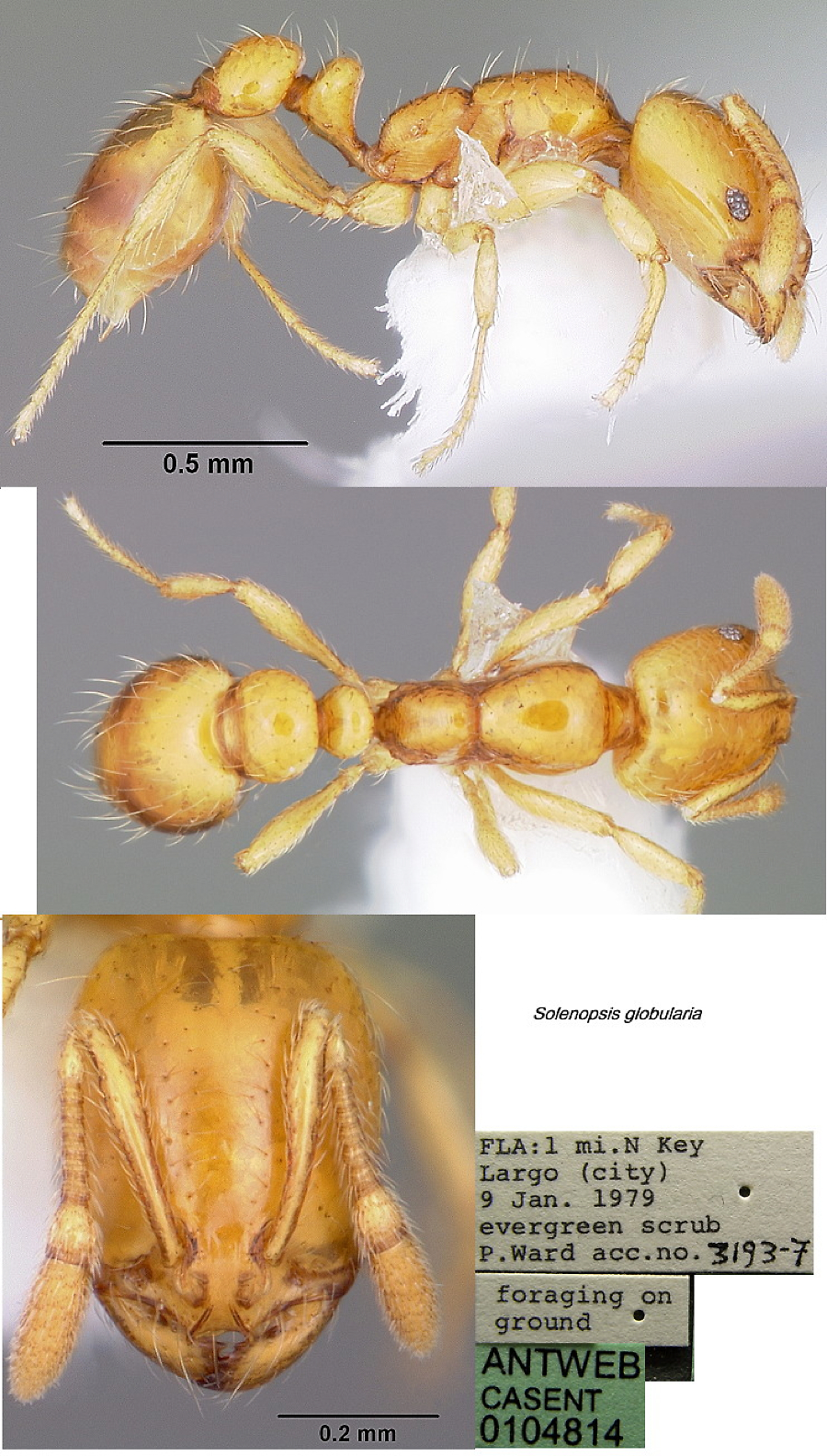 The
photomontage is of a type form worker collated from http://www.antweb.org/specimen.do?name=casent0104814. The
photomontage is of a type form worker collated from http://www.antweb.org/specimen.do?name=casent0104814.
|
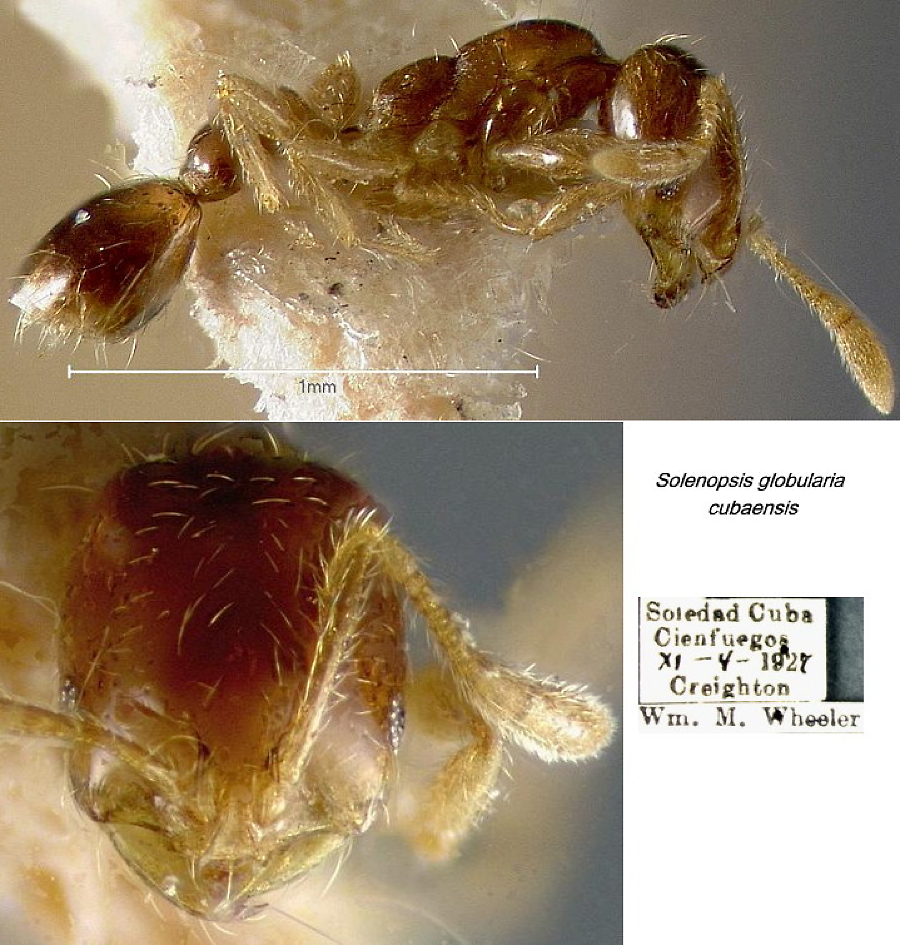 The photomontage
is of a cotype of cubaensis
from the MCZ collection. In his description, Wheeler (1913b) had - "Solenopsis
globularia (F. Smith) var cubaėnsis, var. nov. - the body
being black, with the ventral portions of the head, thorax and pedicel,
the clypeus, mandibles and anterior border of the head, the antennae,
legs, sutures of the thorax, and apical margins of the gastric segments
brownish yellow". The photomontage
is of a cotype of cubaensis
from the MCZ collection. In his description, Wheeler (1913b) had - "Solenopsis
globularia (F. Smith) var cubaėnsis, var. nov. - the body
being black, with the ventral portions of the head, thorax and pedicel,
the clypeus, mandibles and anterior border of the head, the antennae,
legs, sutures of the thorax, and apical margins of the gastric segments
brownish yellow".
|
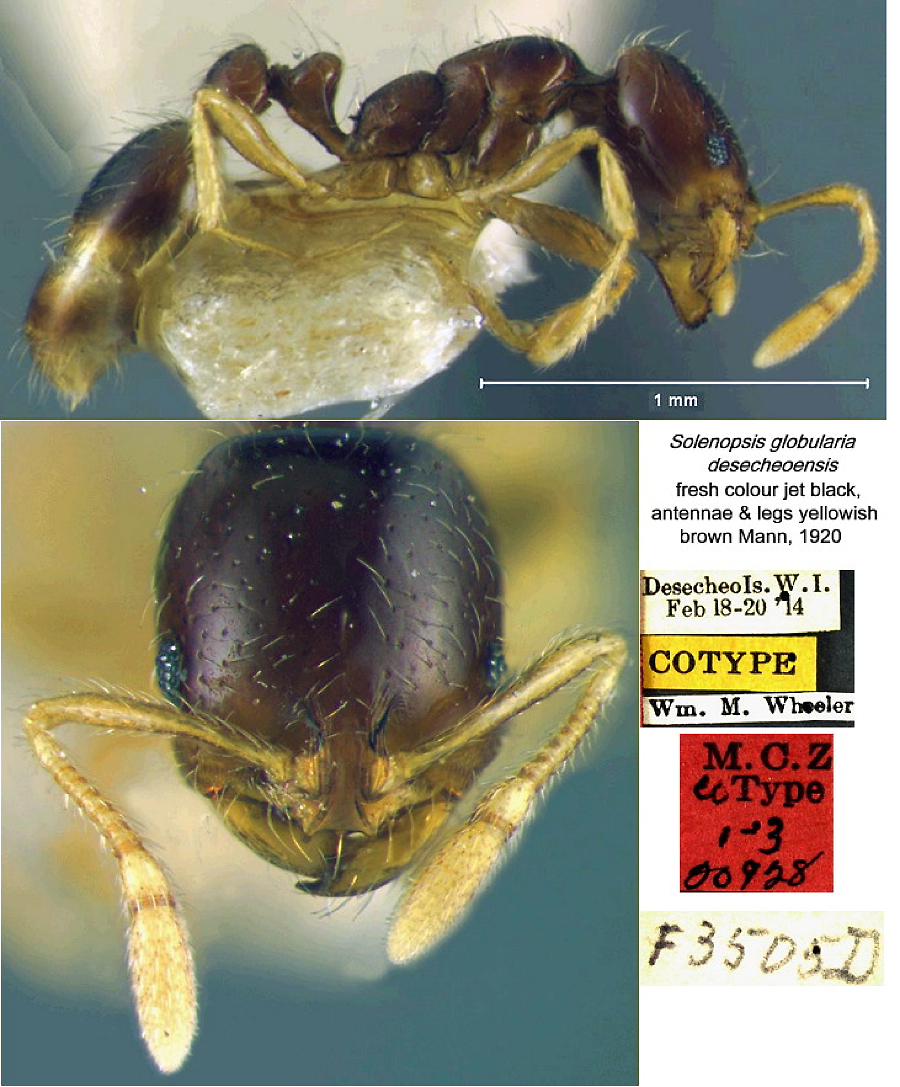 Solenopsis
desecheoensis (Solenopsis globularia F.
Smith desecheoensis new variety,
Mann, 1920: 428, worker) from Puerto Rico, Desecheo Is., F.J.
Lutz - see below. Solenopsis
desecheoensis (Solenopsis globularia F.
Smith desecheoensis new variety,
Mann, 1920: 428, worker) from Puerto Rico, Desecheo Is., F.J.
Lutz - see below.
The
photomontage is of a cotype of desechoensis
from the MCZ collection. In his brief original description, Mann
(1920b: 428) had - "Solenopsis globularia F. Smith desecheoensis,
new variety. Two workers, collected by Frank E. Lutz, given to me by
Prof. Wheeler belong to an undescribed variety of globularia,
differing from the typical form and the variety borinquenensis
Wheeler in color. The head and body are jet black, with the antennae
and legs yellowish brown. Desecheo Island, Porto Rico." The oriiginal
images on the MCZ website are very yellow in overall tone and I have
applied an artificial correction to achieve what seems to be nearer to
the Mann description, noting that Creighton (1930b) gives it as a "deep
piceous brown".
Pacheco & Mackay (2013: 148) have this as a separate
species. "Solenopsis desecheoensis is
different from the widely distributed S.
globularia in that it is a dark piceous brown with yellow-brown
appendages, has a more developed medial c1ypeal tooth and an eye of
22-25 ommatidia. Based on the material examined (only three workers),
it appears to be monomorphic, opposed to the polymorphic members of the rest of the globularia species
group. We will be conservative and recognize S. desecheoensis as a valid
species".
Key: Eye with approximately 25 ommatidia (Fig. 75);
concolorous dark brown; striae present on dorsum of propodeum (Fig. 76); Desecheo Island
near Puerto Rico.
|
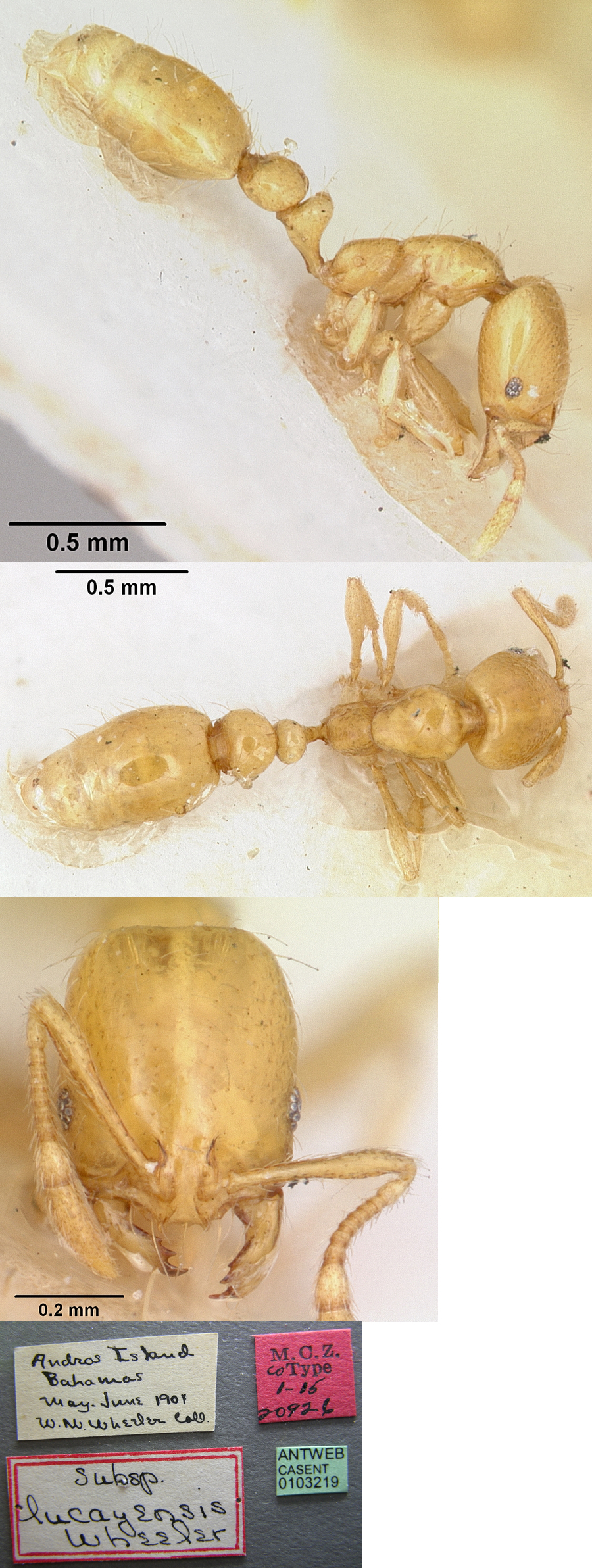 Solenopsis lucayensis
(Solenopsis globularia subsp. lucayensis,
Wheeler, 1908a: 131,
illustrated, worker) from Bahamas. Solenopsis lucayensis
(Solenopsis globularia subsp. lucayensis,
Wheeler, 1908a: 131,
illustrated, worker) from Bahamas.
Image collated from https://www.antweb.org/specimenImages.do?name=casent0103219
Pacheco & Mackay (2013: 148) have this as a separate species.
Key: Eye with 12-15 ommatidia (Fig. 159); concolorous pale yellow;
striae lacking on dorsum of propodeum (Fig. 160); Bahamas, Andros Island.
Comparing the type images shows no difference between this and the S. globularia type (above).
|
Oxford University Museum
specimens
Solenopsis globularia
B Taylor det.
|
Congo
Y Braet
t-1-2
|
19.viii.2007
Brazzaville
4° 15' 33" S
15° 17' 5" E
|
24h pitfall trap;
forest around the GERDIB laboratories; 317 m asl
|
2
|
 |
Solenopsis globularia
B Taylor det. |
Congo
Y Braet
t-1-10
|
19.viii.2007
Brazzaville
4° 15' 33" S
15° 17' 5" E
|
24h pitfall trap; in
a domestic garden near the GERDIB laboratories; 317 m asl
|
4
|
 |
|
 The
photomontage is of a minor worker from Congo, Brazzaville;
collectors Yves Braet & Eric Zassi (t
1.2). This and the second worker shown below are a little larger than
the Smith paratype (above). The
photomontage is of a minor worker from Congo, Brazzaville;
collectors Yves Braet & Eric Zassi (t
1.2). This and the second worker shown below are a little larger than
the Smith paratype (above).
|
 The
photomontage is of a minor worker from Congo, Brazzaville;
collectors Yves Braet & Eric Zassi (t
1.11). The
photomontage is of a minor worker from Congo, Brazzaville;
collectors Yves Braet & Eric Zassi (t
1.11).
|
|